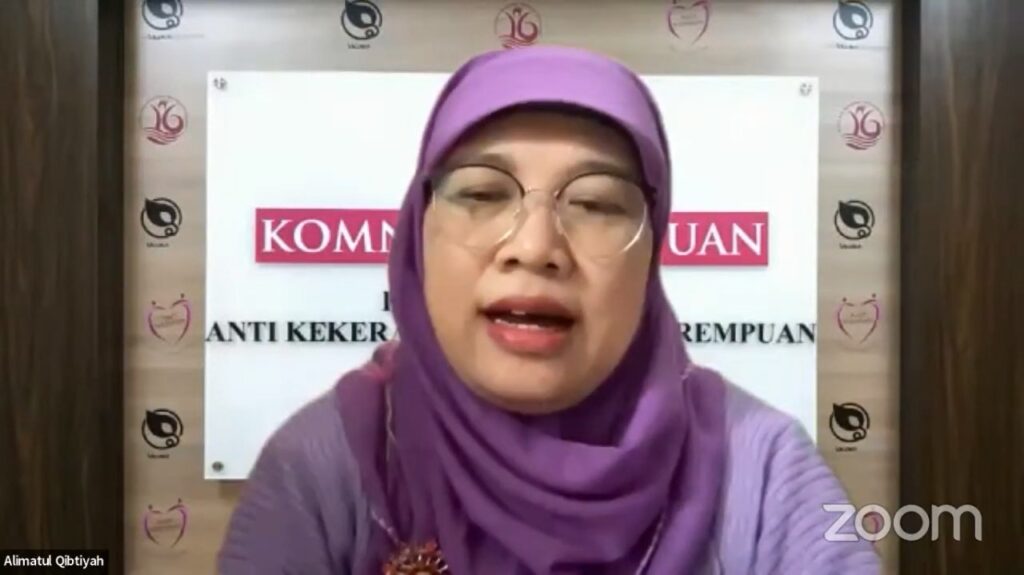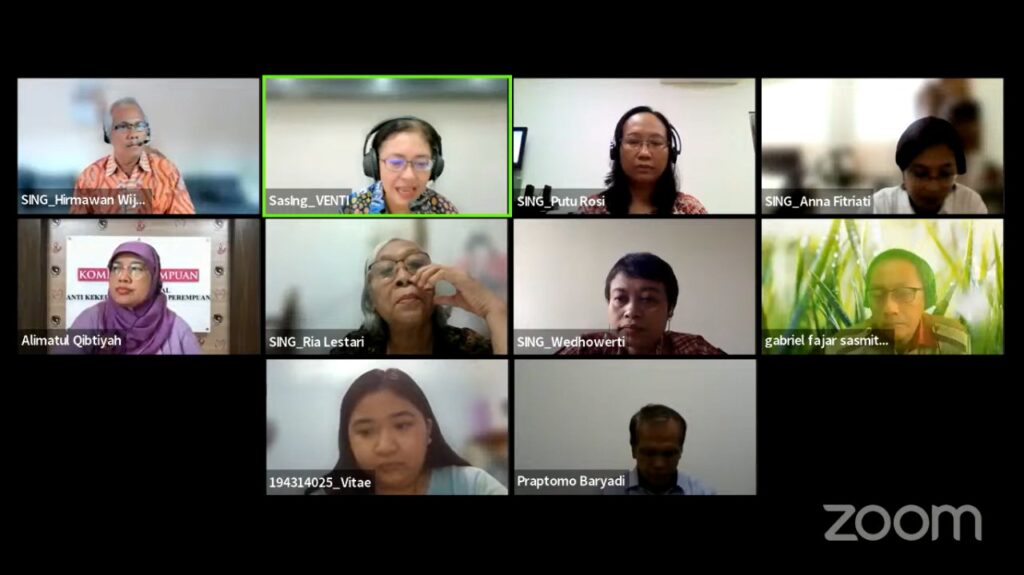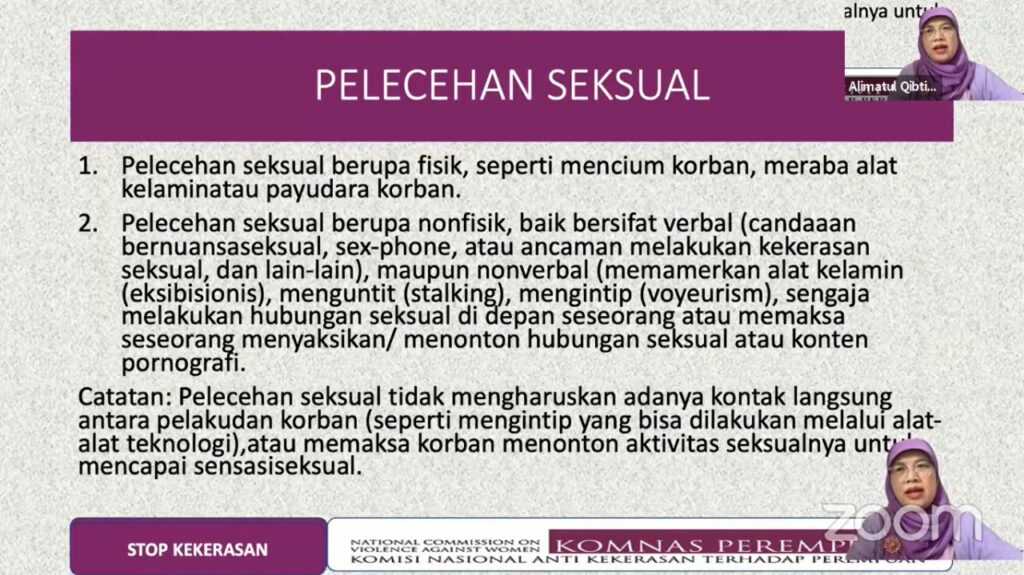

As part of the opening of the even semester, the English Letters Department of Sanata Dharma University held a public lecture themed “Towards a Campus Free of Sexual Violence”. The public lecture was held on Monday, February 7, 2022, in an online video conference application, Zoom.
The speaker of the public lecture was originally intended to be Mrs. Andy Yentriyani, but due to her being unwell, she was replaced by Prof. Alimatul Qibtiyah, Ph.D., the Commissioner of The National Commission on Violence against Women. The moderator of this public lecture was Mrs. Adventina Putranti, a lecturer in English Letters Department. Students of English Letters Department from various semesters attended the lecture.
The lecture was opened by Mrs. Venti as the moderator and was then followed with a prayer led by Sir Simon. “Thank you to Mrs. Alimatul for the willingness to attend this lecture. Sanata Dharma University, especially from the English Letters Department, is working hard to raise awareness regarding the topic of sexual violence and prevent it from happening on campus. Thank you also to everyone who attended this lecture,” said Sir Hirmawan Wijanarka as the Head of the English Letters Department.
Mrs. Alimatul then proceeded to give the lecture. The materials of the lecture were divided into three parts. The first part was the definition and forms of sexual violence, the second was the difficulties faced by victims of sexual violence and the laws regarding the topic, and the last one was the means to prevent and regulate sexual violence cases.
“Sexual violence can be defined as every act related to sex that is degrading and/or harassing while taking advantage of inequality and vulnerability that results in physical and mental trauma,” she defined.

Sexual violence attempts can manifest in multiple ways. One seemingly harmless example of this is cat-calling. “It may look harmless and a lot of people are playing down its effect but that is why the act is also called as fake hospitality. An example of this is saying greetings or Assalamualaikum but in a flirty way that makes the victim uncomfortable,” Mrs. Alimatul added.
It is also a well-known fact that victims of sexual violence face a lot of difficulties when they try to speak up or report to the authorities. Trauma, fear of prejudice, and victim-blaming are often found in a lot of sexual violence cases. “Victims are often afraid to speak up because of the prejudice and victim-blaming that is common in our society. People often blame the victims for allegedly enjoying the act of sexual violence or the way the victims dress,” said Mrs. Alimatul after a video regarding the topic has been played.
Contrary to what a lot of people might believe, men are also victims of sexual violence. As much as 33% of men are victims of sexual violence based on 2020 research by the International NGO Forum of Indonesia (INFID). Men also face difficulties when they try to speak up because they are afraid of being perceived as weak by society, especially by other men. People often accuse men who are victims of sexual violence that they enjoy the act while the truth is the opposite. “Men are also victims of their own social and power construct that is patriarchy,” said Mrs. Alimatul while explaining the research done by INFID.
Mrs. Alimatul also expressed her concern regarding the rise of reports on sexual violence in Indonesia, especially in academic institutes such as universities. “Education is a stepping stone, so every campus and university in Indonesia must be free from any kinds of violence and be a healthy environment for students to develop their full potential,” said Mrs. Alimatul on one occasion.
A questions and answers session was held after the materials have been given. A lot of the students asked and shared their experiences regarding the topic of sexual violence. One student asked about what students can do in case they are a victim of sexual violence. Another asked what men can do if they are a victim of sexual violence. Mrs. Alimatul proceeded to answer these questions by recommending the victims to report to the campus and be given counseling. After being counseled, a report can be made and then sent to the authorities.
After the questions and answers session, the lecture was closed with a prayer.
In a separate interview, Maria Lee as one of the students who attended the lecture shared her experience and knowledge she had learned from the lecture. “From this lecture, I learned a lot of things related to sexual violence. I become more aware of what sexual violence are, its forms, and how to act around it and help people when they become a victim. I also learned to not be afraid of speaking up because there are a lot of ways and also institutes such as The National Commission on Violence against Women for victims to get help,” said Lee when asked about what she had learned from the lecture.
“I’m thankful for the government and especially USD for this lecture because they are raising awareness regarding the topic and for showing the initiative that they truly care for the students,” said Lee closing the interview.
Journalist: Lintang Samodra
Editor: Cynthia Olga Handoko, Cherry Larissa Hendranata (QC)

 He was born deprived of strength, deaf, and unable to speak, but he has a dream to become the “Rank 1”. That is the description of the character “Bojji” from the anime series “The Ranking of Kings”.
He was born deprived of strength, deaf, and unable to speak, but he has a dream to become the “Rank 1”. That is the description of the character “Bojji” from the anime series “The Ranking of Kings”.